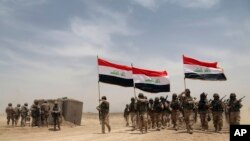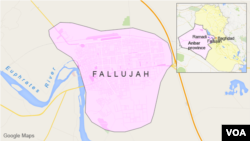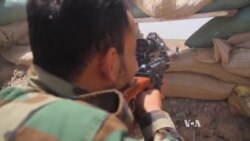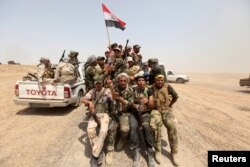Suicide bombings killed at least 17 Iraqi soldiers in Anbar province overnight, as pro-government forces in Iraq continue their newly launched campaign to disrupt the Islamic State group in the area.
Iraq's Asharqiya TV reported that a suicide bomber blew up his vehicle outside the gates of a military compound, housing the First Commando Brigade near the city of Fallujah. Another IS suicide attacker reportedly struck an Iraqi convoy near Garma, east of Fallujah.
Iraqi military officials said the attacks outside the IS-held city of Fallujah late Tuesday came hours after the launch of an offensive to retake parts of the province from militants.
The military and militias are focusing on areas outside of the provincial capital of Ramadi in an attempt to cut the militants' supply lines before moving in on the city itself.
Islamic State fighters maintain a supply line into Ramadi from the city's western side while thousands of military and paramilitary forces are building their counter-offensive on the outskirts, Pentagon spokesman Army Col. Steve Warren said Wednesday.
Related TV report by Meredith Buel:
The operation began Tuesday with fresh support from the United States as White House officials sought to reaffirm their commitment to Iraqi forces, following comments from Defense Secretary Ash Carter questioning the Iraq military's will to fight.
Warren added that the militants are preparing to defend their position by planting explosives in the area.
White House spokesman Josh Earnest said the U.S. will make sure the Iraqi military has the equipment it needs, including an anti-tank weapon that is highly successful at destroying car bombs.
Earnest also said the U.S. believes the fight in Ramadi will require a multi-sectarian force to succeed.
"And the reason for that is Iraq is a very diverse country and they're going to need every element of their diversity to counter this specific threat ... and it's going to require a multi-sectarian security force to take the fight to ISIL and to not just drive ISIL out of the country, but also to hold the ground," Earnest said, using an acronym for the Islamic State group.
Earnest said this strategy - a multi-sectarian force under central Iraqi command, backed by U.S.-led coalition airstrikes - worked when Iraqi forces retook the important city of Tikrit from Islamic State fighters.
Recaptured territory
Iraqi media reported that Shi'ite volunteer forces near the provincial capital of Ramadi made gains against IS, which currently holds the city. Iraqi state TV said the forces captured the areas of Ta'ash and Humyra, south of Ramadi.
Al Arabiya TV reported Shi'ite militiamen were in control of high ground outside the army's Eighth Brigade headquarters in Ta'ash and that they were four kilometers away from the Anbar University campus, near Ramadi. Iraqi TV, however, said that they had taken part of the campus.
The deputy head of the Anbar province council, Falah al Aissawi, told Iraqi media that Shi'ite militiamen and Iraqi tribal fighters control a strategic area near Ramadi. Aissawi the Iraqi military command affirms it took control of the south and west of Ramadi during the past 72 hours, cutting supply lines and inflicting casualties on Islamic State.
Hadi al Amari, a top Shi'ite militia leader, told Iraqi TV his men were preparing to mount another offensive against IS militants north of Baghdad to stop their attempts to advance on the capital, insisting that Baghdad would not be an easy target for the militants.
Iraqi PM expresses confidence in troops
Iraqi Prime Minister Haider al-Abadi has said Ramadi would be retaken in a matter of days, and that he has confidence in the ability of his troops.
Hilal Khashan, who teaches political science at the American University of Beirut, tells VOA he thinks Iraqi Shi'ite militiamen would eventually take Ramadi, but only with U.S. air support.
“If the U.S.-led coalition is willing to provide them with tactical air support, I think that eventually they will retake (Ramadi). But, I do not believe what Iraqi Prime Minister (Abadi) said recently that al Anbar will be liberated within a few days. It will take much longer than that.”
Khashan stressed, however, that recapturing Ramadi with Shi'ite militia forces would be a nail in the coffin of a U.S. proposal to put together a national guard for Anbar made up of Sunni tribal fighters. He also insists such a victory would exacerbate sectarian tensions in the country.
Anbar is a vast desert area stretching from just west of Baghdad to the Iraqi borders with Jordan, Syria and Saudi Arabia. Islamic State has controlled most of Anbar since last year, including the city of Fallujah.
Carla Babb contributed to this report from the Pentagon, Victoria Macchi and Meredith Buel contributed from Washington. VOA's Kurdish service also contributed to this report.








